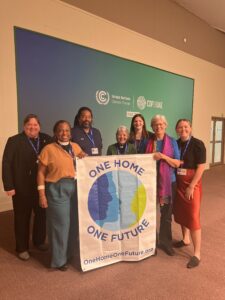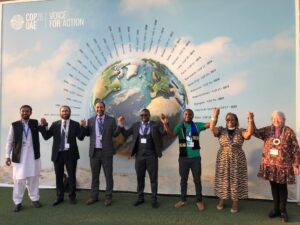While an Agreement is Reached, Much Work Remains to Mitigate Climate Change

“As COP ends in this season of Advent, we are reminded of the unique voice of the faith community. Advent asks people of faith to actively wait, to sit, to observe, and to use our voices to uplift those around the world who are vulnerable — in this case to impacts of the climate crisis,” noted a PC(USA) COP28 delegate, Christina Cosby, domestic policy representative in the Office of Public Witness. “This anticipatory waiting is not easy, demanding that we embrace the tension between the present reality and our hopeful aspirations. We feel disappointment as leaders prioritized politics over people and the planet. Simultaneously, a glimmer of hope emerged today as policies shift from wide inclusion to phasing out fossil fuels, a primary contributor to the rising temperature of our planet.”
The COP28 Presidency website touts the final agreement, called the UAE Consensus, reached at the summit as an “enhanced, balanced, historic package” to accelerate climate action. One ABC News article offers another view, that COP28 President Dr. Sultan Al Jaber walked out with what the United Arab Emirates wanted all along — the prestige of hosting negotiations that got the world to agree to transition away from fossil fuels while still being able to pump ever-more oil.
The UAE Consensus does call for a “transitioning away from fossil fuels in energy systems, in a just, orderly and equitable manner, accelerating action in this critical decade, so as to achieve net zero by 2050 in keeping with the science.” It also urges for “accelerating efforts towards the phase-down of unabated coal power” and for “tripling renewable energy capacity globally and doubling the global average annual rate of energy efficiency improvements by 2030.”

Photo credit: Rabbi Yonathan Neril, The Interfaith Center for Sustainable Development
It does not mandate an absolute phase-out though. A “phase-out” commitment requires a shift away from fossil fuels until their use is eliminated, while a “phase-down” agreement merely indicates a reduction in their use — but not a true end.
Sultan Al Jaber delivered remarks at the closing of COP28 declaring that “we can truly say that we united, we acted, and we delivered.” While he did acknowledge that “an agreement is only as good as its implementation. We are what we do, not what we say. We must take the steps necessary to turn this agreement into tangible action,” many believe that COP28 missed a crucial opportunity and could only be considered a success if it resulted in a deal to phase out all fossil fuels.
Alden Meyer, a senior associate at the independent climate change think tank E3G stated that “The atmosphere responds to one thing: Emissions. And all the declarations, all the decisions, all the platitudes, all the announcements in the world, if it doesn’t translate into real world action that reduces emissions, is not worth the paper it’s written on.”
ACT Alliance, a PC(USA) partner, shared that overall, COP28 started on a high note for those concerned about climate justice. Parties agreed to operationalize the Loss and Damage Fund with pledges of up to $792 million. Sadly, this is less than 1% of what is needed to support people facing the greatest challenges from the impacts of climate change.
Despite what feels to many as a disappointing end, speakers at a Religion Media Centre briefing reminded us that the shortcomings of COP28 are not the end of the story.
Faith communities continue to have a key role in moving forward progress on climate change. Rabbi Yonatan Neril, founder and current director of the Jerusalem-based Interfaith Centre for Sustainable Development, said, “It’s not all about fossil fuels and decarbonization. There’s actually something deeper happening on Planet Earth, which is … that the climate crisis has deeper roots, including materialism, greed, short-term thinking and finding our pleasure and fulfilment in the physical world. It’s not about trying to maximize our narrow national interests. It’s about how do we, as a collective, as humanity on one ship, come together to solve this crisis through an awareness of interdependence, interconnected action, love for God’s Creation, humility, simplicity, modesty.”
“This conference is big. This crisis is big. This moment in history is big. What is required of us to meet this moment is big,” said PC(USA) delegate, the Rev. Jed Koball, Joining Hands Catalyst for Extractive Industries, Human Rights and the Environment. “And yet it is so simple. It’s about showing up, again and again and again. Like the many, many people across this one planet we share who have been fighting the good fight day after day, year after year, whether at a COP on the other side of the world or in their own back yard, it all matters. Each movement matters. Each person matters. Each face and name matters — names and faces we can only know as long as we keep showing up.”
Read the full article: https://www.presbyterianmission.org/eco-journey/2023/12/13/cop28review/
About the Author:
Jessica Maudlin, Associate for Sustainable Living and Earth Care Concerns, Presbyterian Hunger Program
Additional Resources:
American Climate Leadership Awards 2024
American Climate Leadership Awards High School Students 2024
Mental Health and Our Changing Climate: Children and Youth Report 2023
